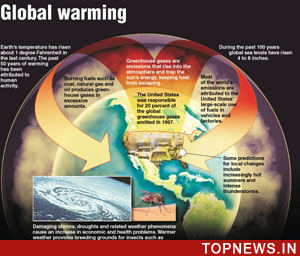For decades, the earth’s oceans have soaked up more than nine-tenths of the atmosphere’s excess heat trapped by greenhouse gas emissions. By stowing that extra energy in their depths, oceans have spared the planet from feeling the full effects of humanity’s carbon overindulgence. But as those gases build in the air, an energy overload is rising below the waves. A raft of …
US Climate Plan ‘Treats the Wound But Does Not Stop the Bleeding’
With bold language and take-charge rhetoric, the White House on Tuesday unveiled its plan to cut U.S. carbon emissions by roughly one third over the next decade, a goal that environmentalists say is commendable but is not enough to keep global warming beneath the critical 2°C threshold. Submitted to the United Nations Framework Convention on Climate Change (UNFCCC) ahead of a midnight …
Poor Farmers Bear The Brunt Natural Disasters In Developing Countries
Nearly a quarter of damages wrought by natural disasters on the developing world are borne by the agricultural sector, finds a new Food and Agriculture Organization of the United Nations (FAO) study released in Sendai, Japan on March 17, 2015 at the UN World Conference for Disaster Risk Reduction. Media reports and a FAO news release said: Twenty-two percent of …
A leading French government minister says the number of natural disasters connected to climate change has doubled in two decades, and is urging a global early warning system.
A senior French political leader, foreign minister Laurent Fabius, has told an international conference on how to reduce the risk from natural disasters that 70% of them are now linked to climate change, twice as many as twenty years ago. Mr. Fabius is the incoming president of this year’s round of negotiations by member states of the UN climate change …




